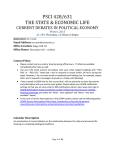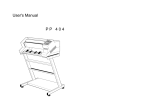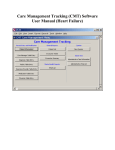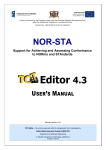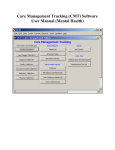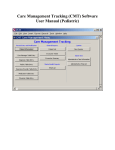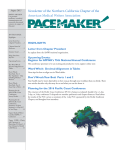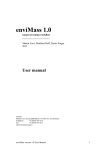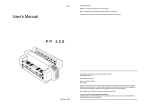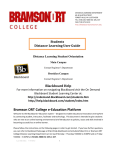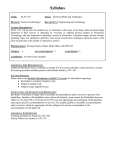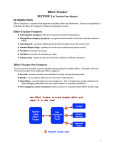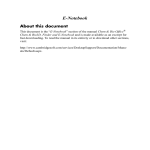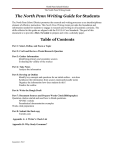Download English 101.063 — Composition: User`s Manual Overview
Transcript
English 101.063 — Composition: User’s Manual Overview Fall 2011 — TR 9:00-10:15 — IN 320 Professor E. Shelley Reid Contact Points: Office: Office Hours: E-mail me: Text me: Mailbox: Course Wiki Robinson A 420; 703-993-2772 T-Th 10:30-11:30, W 4:30-5:30, and by appointment [email protected] (571) 306-2772 (text only, no voice mail) Robinson A 487 https://engh101063f11.pbworks.com/ Course Materials: Text: Writer’s Help, an online handbook from Bedford/St. Martin’s, 2- or 4-year access. Reading: By September 29, purchase one of the following: Fishman’s The Big Thirst, Neuwirth’s Shadow Cities, Pollan’s Omnivore’s Dilemma, Skloot’s Immortal Life of Henrietta Lacks, or Turkle’s Alone Together. Do not buy a book until you’ve joined a team! Other: Have a USB/flash drive or “cloud” account (e.g., Dropbox.com) to transport files. Activate your GMU email account. Note: Plan to back-up your computer files regularly: don’t risk losing the work you spent so much time on. The Official Description This is a course in improving your abilities to read, reconsider, analyze, plan, draft, evaluate, and revise writing in a range of common American academic essay genres. This course also aims to help you find ways to value the writing you do as a tool for learning or expression, to expand your research skills and persuasive abilities, to adapt your writing to new audiences and contexts, to handle the various technologies and writing-processes common to 21st-century writers, and to become your own best writing instructor so that you can continue to improve your writing skills and strategies as you move into other courses and situations. The Basic Grading Outline 10% 15% 30% 5% 20% 50 points 75 points 150 points 25 points 100 points 20% 100 points Project 1: Re-present Your World Project 2: Complicate the Conversation Project 3: Make Your Case Project 4: Go Public Solving Writing Problems: Problem Analyses, Peer Reviews, Decoder, Sentence Solver, Final Quiz Participation: Daily Prepwork and Classwork A grade of “C” or better (365/500 points) is required to earn credit in this class. Due 9/16 Due 10/21 Due 12/2 Due 12/15 2 Other Grading Policies Completion Policy: You must complete all four major drafts and projects to pass the class. Academic Integrity: Although you will frequently consult with others during the writing process, you must turn in formal writing that primarily results from your own thought and effort. Your work in this class may reflect your broad, enduring interests—but you must present new pieces of writing specifically for this class, not repeats from other situations. The Inside Scoop, Part 1: Solving Writing Problems Writers have to be able to solve communication problems—like engineers solve engineering problems, actors solve performing problems, and historians solve history problems. In this class, we’ll focus a lot on improving how you solve writing problems, so that you don’t just do well on English 101 assignments, but you learn how to be a more powerful, efficient, engaged writer in the rest of your life. Part of your grade for this class will be for your explanations about what you plan to write and why, and how you’ll solve writing problems. See more in the User’s Manual. The Inside Scoop, Part 2: The Upside-Down Class In some classes, you sit in your chair and listen to the teacher tell you things you need to know, and then you go home and solve problems or write essays on your own. We’ll turn that model upside down: you’ll gather information about what you should know while you’re doing homework and class preparation, and try out first versions of your solutions, and in class we’ll work on the hard problems together, give one another feedback and try out new skills. Part of your grade for this class will be for learning as much as you can on your own at home, coming to class with questions and plans, and participating in our writing and analysis work in class. See more in the User’s Manual. The Inside Scoop, Part 3: Going From You 2.0 to You 3.0 Everybody here is already a good writer—even those of you who don’t like writing much—but the writing problems you’re about to be faced with, in college and outside of it, are about to get harder. So you need an upgrade, and only you can install it. Upgrading your writing strategies often requires a mix of the following: imagination, mind-reading, confidence, uncertainty, flexibility, humor, knowledge, inquiry, support from good friends, feedback from nitpicky grumps, revision, an awareness of genres and rules, time, a willingness to go outside the box (and to create your own boxes), patience, thought, intensive reading, more thought, more patience, more time, giving up, trying again, honesty, strategizing, more revision, planning, innovation, inspiration, resistance, anticipation, stomping around, having a clear purpose, exploration, and/or chocolate. Part of your grade for your projects in this class will depend on the improvements you make as a writer and problem-solver. P.S. Most people are only willing to write well when they’re writing about something that’s important enough to them that they will undertake all of the above work. If you want to write well in college, it will help to figure out how to find something important that you want to write about, or find what’s important to you in what you must write about. We’ll take time this semester to work on that kind of strategizing, as well. 2 3 Instruction and Classwork Overview Most of our class sessions will be highly interactive and involve a significant amount of focused student discussion and writing. You will be encouraged to find ways to link class assignments with your other interests and activities. You will also carry some responsibility for working on particular aspects of your writing that you wish to improve—and for helping your classroom peers improve their own writing. Good writing is more frequently a result of time and patience than of inborn talent. Students who attend regularly, keep up with the small assignments, and block off extra time each week for careful reading, thoughtful drafting and focused revising usually succeed in this class. (Note: A common assumption in college is that you’ll spend about 5-6 hours per week on homework for each class. A writing class sometimes requires more than that.) E-contact If you’re stuck on something, please ask for assistance! I would rather solve a small problem with you early than try to work through a big sticky mess later. If you have a question, please check the Wiki and the User’s Manual first, since they have a lot of information, but then please do contact me to let me know what you still have questions about. In addition to coming physically to my office hours or setting up a conference, you may • Email me with questions about class at [email protected]. Please put “Engh 101” in the subject line, include a salutation and signature, and describe what you already know or have tried to find out, related to your question. Allow 48 hours for time-sensitive requests; I do email-catch up with less urgent messages on Saturdays. • Text me with a quick question, but only if you’ve already tried to find the answer on your own! (I won’t respond to messages that ask “what’s due for class tomorrow?” or “can I turn in my assignment late?”) Please remember to sign your name to your message, since I won’t necessarily have that information. The University Writing Center Since you will be writing several assignments in this course, you may want to visit the University Writing Center (http://writingcenter.gmu.edu), located in Robinson A114, for assistance. The Writing Center is one of the best resources you will find on campus. They have an outstanding website that offers a wealth of online resources for student writers. You can schedule a no-cost 45-minute appointment with a trained tutor to help with any phase of the writing process. You can even obtain assistance with papers by visiting the online writing center at http://writingcenter.gmu.edu/owl/index.html, but please plan ahead and allow yourself at least 2-3 days to receive a response. Make an appointment via their website. 3 4 University Policies Midterm Grades In English 101, you will receive a midterm letter grade based on the work of the first seven weeks of the course, to help you find out how well you’re doing in order to make any adjustments necessary for success in the course as a whole. The work in the second half of the semester may be weighted more heavily, and so the midterm grade is not meant to predict the final course grade. You’ll be able to view your grade online. Final Grades Students in English 101 must earn a grade of C or higher to complete the 101 requirement; students whose grades are lower than a C will earn an NC. A grade of NC reflects the philosophy that learning to write in an academic setting is a developmental process and that some students may require more time in this development. Since this grade does not affect students’ Grade Point Averages, students are not penalized for requiring additional time to meet the course requirements in ENGH101. Because of this policy, grades of Incomplete are not given in ENGH101. General Education This course is part of the GMU General Education Program, which is designed to help students prepare for advanced work in their major field and for a lifetime of learning. For more information on the mission of the General Education Program, consult the University Catalog or visit http://provost.gmu.edu/gened. Students with Disabilities Students with documented disabilities are legally entitled to certain accommodations in the classroom. If you are a student with a disability and you need academic accommodations, please see me and contact the Office of Disability Services (ODS) at 703-993-2474. All academic accommodations must be arranged through the ODS. I will be happy to work with students and the ODS to arrange fair access and support. GMU Nondiscrimination Policy George Mason University is committed to providing equal opportunity and an educational and work environment free from any discrimination on the basis of race, color, religion, national origin, sex, disability, veteran status, sexual orientation, or age. GMU shall adhere to all applicable state and federal equal opportunity/affirmative action statutes and regulations. GMU Email Students must activate their Mason email account and check it regularly. For privacy reasons, all class-related emails will be sent only to students’ official GMU email addresses. Important Dates • Last Day to Add a Course: September 6 • Last Day to Drop a Course: September 30 (with tuition penalty) • Selective Withdrawal Period: October 3-28 4 5 Composition Program Statement on Plagiarism Plagiarism means using the exact words, opinions, or factual information from another source without giving that source credit. Writers give credit through the use of accepted documentation styles, such as parenthetical citation, footnotes, or end notes; a simple listing of books, articles, and websites is not sufficient. This class will include direct instruction in strategies for handling sources as part of our curriculum. However, students in composition classes must also take responsibility for understanding and practicing the basic principles listed below. To avoid plagiarism, meet the expectations of a US Academic Audience, give their readers a chance to investigate the issue further, and make credible arguments, writers must • put quotation marks around, and give an in-text citation for, any sentences or distinctive phrases (even very short, 2- or 3-word phrases) that writers copy directly from any outside source: a book, a textbook, an article, a website, a newspaper, a song, a baseball card, an interview, an encyclopedia, a CD, a movie, etc. • completely rewrite—not just switch out a few words—any information they find in a separate source and wish to summarize or paraphrase for their readers, and also give an in-text citation for that paraphrased information • give an in-text citation for any facts, statistics, or opinions which the writers learned from outside sources (or which they just happen to know) and which are not considered “common knowledge” in the target audience (this may require new research to locate a credible outside source to cite) • give a new in-text citation for each element of information—that is, do not rely on a single citation at the end of a paragraph, because that is not usually sufficient to inform a reader clearly of how much of the paragraph comes from an outside source. Writers must also include a Works Cited or References list at the end of their essay, providing full bibliographic information for every source cited in their essay. While different disciplines may have slightly different citation styles, and different instructors may emphasize different levels of citation for different assignments, writers should always begin with these conservative practices unless they are expressly told otherwise. Writers who follow these steps carefully will almost certainly avoid plagiarism. If writers ever have questions about a citation practice, they should ask their instructor! Instructors in the Composition Program support the George Mason Honor Code, which requires them to report any suspected instances of plagiarism to the Honor Council. All judgments about plagiarism are made after careful review by the Honor Council, which may issue penalties ranging from gradedeductions to course failure to expulsion from GMU. 5 Grading for Short Assignments: Solving Writing Problems (20%) Prepwork & Complete Early Drafts (20%) Short writing assignments will marked as Honors (100%), Satisfactory (80%), Unsatisfactory (60%), or 0. For Prepwork and SWP analyses, a score of “S” marks an assignment in which the work is mostly complete, on time, and correct, showing that the writer has given some thought to the assignment. “H” work will demonstrate more critical thinking: question-asking, suggestion-making, gray-areaspotting, complexity-wrestling, or other kinds of mental-stretching. If you earn a mix of H’s and S’s, you’ll likely be on track with “A”-level work for this part of your grade. Zeros will have a significant lowering effect on your grade. (Each one will be worth up to 2% of your final overall grade in this class.) Late short assignments will go down one mark (20%) each CLASS MEETING they are late. An assignment that would have been marked “H” will be marked “S” if it is turned in by the start of the class meeting after it was due. Leeway: To accommodate the complications of adult lives, your lowest short-assignment mark in each category (except Complete Early Drafts) will be dropped before the final grade is calculated. Complete Early Draft Scores are advisory—they do not predict the grade of the final project. H — Drafts receiving this mark have a very clear focus; they have sufficient specific evidence to support their claims; they have intelligently analyzed the issue at hand, wrestling with complex issues; they flow smoothly and have coherent organization. They have few or no major errors, and do not make the reader do additional work to guess at their meaning or progression. They will nearly always still benefit from revision: revisions will focus on further developing ideas, polishing organization or style, and/or fine-tuning the voice or evidence. S — Many early drafts will earn this mark. They generally meet all the assignment requirements: they demonstrate significant attention to focus, evidence, analysis, and organization. They make the author’s general intentions clear, but often they will need significant revisions in one or more fundamental areas of the essay assignment: the author may not yet have settled on a single focus, may have misinterpreted the assigned reading or provided description rather than analysis, may have relied on too-little or too-general evidence throughout, and/or may not chosen a clear organizational path. Essay drafts with persistent grammatical errors may also earn this score. U — When an author’s intentions are not yet clear or his/her arguments are currently too thin or disorganized to support the essay’s purpose, a draft will earn a lower mark. Such drafts are difficult to read, lacking focus or relying entirely on vague generalizations that require the reader to guess at meanings; they may have serious, distracting grammatical errors. The author may have misunderstood the assignment, misread of one or more of the assigned texts, invested less time than necessary in the drafting process, and/or have misunderstood the expectations of a university-level academic audience. A conference with the professor before revising is strongly recommended; substantial changes may be necessary for the final essay to earn a passing score. 6 6 7 Final Essay Scores will have letter-grade equivalents; you can divide points-earned by points-possible and use standard 90%-80%-70% breakdowns to see how you stand. Generally, A “C” level grade (70-79% of possible points) denotes average college-level writing and achievement. The essay is a competent response to the assigned writing task: it meets, to some degree, all the assignment requirements, and demonstrates that the author has put significant time and effort into solving writing problems and communicating his/her ideas to his/her targeted audience. It has a focus or argument, presents some support, moves from point to point in an orderly fashion, and contributes to the classroom conversations on the topic. A “B” level grade (80-89%) highlights a strong example of college writing and thinking. In addition to meeting the “C” level requirements, such an essay demonstrates some insight into the “gray areas” of the topic, provides original or very thorough support that is tightly woven into the overall argument, reads smoothly at both the sentence and paragraph levels, and/or exhibits a personal “voice” or style. It has few if any errors. An “A” level grade (90-100%) marks an essay that—in addition to being focused, organized, and well-developed—provocatively engages the reader in conversation. Even more than in a “B” essay, its author anticipates and responds to possible reader questions, uses a wide range of supporting evidence, provides unexpected insights, and/or uses language with care and facility. “D” and “F” level essays do not meet the basic expectations of the assignment. You should plan to revise them, after consulting with me. Optional Revision Policy: Projects #1, #2, and #3 may be re-revised for a possible new grade. (Late-work penalties cannot be changed through revision). 1. Before completing an Optional Revision, you must schedule a Revision Conversation with me, in person or via email. You should begin this conversation having carefully read all feedback on your essay and thus prepared to explain and ask questions about your revision plan. 2. Optional Revisions must demonstrate substantial change to the focus, support, approach, or organization of the essay in addition to comprehensive error correction, or they will be returned with no grade change. Substantial change may be thought of as change to at least 15-20% of the essay’s text; you must address widespread problems as well as providing small fixes. Revised essays must, however, retain the original text’s topic and approach; revision does not mean “write a new essay.” 3. Optional Revisions must be completed within two weeks of the essay’s return to you. This is true even if you were not available when most essays were returned. 4. Optional Revisions should be resubmitted along with a paragraph describing the key changes made and how they better solve the writing problems of the overall essay. 7 English 101 Be / Here / Now: Participation and Late-Work BE: Writing isn’t really about formulas, grammar, word-counts, or fonts. It’s about one human figuring out how to communicate with other humans. To write, you have to be: you have to be yourself and think and speak for yourself, to be active and involved, to be listening to other people, to be different from other writers, and to be connected to the people and world around you. BE HERE: Classwork Grade: Participating in the basic events of each class meeting will earn you a Satisfactory grade (80%) for classwork; to earn a higher grade, you need to find a way to contribute more actively: ask/answer questions, provide feedback, keep your team on track, help others be themselves and be here. Sleeping, reading the paper, texting, Facebooking or working on assignments for other classes (etc.) are ways of NOT BEING HERE, and will cost you classwork credit. (Any serious breach of good conduct may cause the loss of all participation credit.) Coming late: Please plan to be here on time. If you are frequently late, you may lose classwork credit. However, in an emergency I would rather have you come late than not at all; if you have a bad day but you can get here 20 minutes late, please try to come. NOW: Lateness is allowed for, but as in most places in our society, it will not be without consequences. The quickest way to get frustrated by a writing class is to fall behind in it. Prepwork assignments will lose 1 score level (from “H” to “S”, e.g.) each CLASS day that they are late. Please also note that Prepworks don’t earn full credit unless you show up to the class. SWP Assignments and Complete Drafts will also lose 1 score level each CLASS day that they are late. These assignments are time-sensitive: completing them helps you write your essay. Late Essays will lose 5% of their points each CALENDAR day that they are late. Lateness due to Rare, Uncontrollable Natural Disasters will not usually incur penalties; it is your responsibility to provide explanation/documentation of such occurrences. (The flu is not rare, an extremely busy work week is not entirely beyond your control, and a lack of parking spots is not a natural disaster. For other events, please contact me as soon as possible to discuss your situation.) Computer Crises are neither Rare nor Natural, and most of them can be avoided or controlled with good advance preparation. Assignments which are late due to electronic disasters will earn sympathy but will also earn the grade penalty. Back up your files, and don’t wait until the last minute! Three-Day-Pass Policy for Late Work For any one Essay, Draft, Prep, or SWP assignment you may be up to three calendar days late without penalty. (Here and only here, a weekend counts as one day.) To qualify, you must state in writing at the top of the first page of any late assignment that you are using your Three-Day Pass; it cannot be taken back to be used for another assignment: I won’t automatically give late work a pass. (If you use the three-day pass for a workshop draft or peer review, you will need to arrange for peer-review on your own in order to earn full credit.) 8 8 Assignments: English 101.063, Fall 2011 Project One, Re-present Your World: 50 points Specifications: 900-1500 words (3-5 pages) Explain and analyze an event or situation Provide support from specific personal experience, textual evidence, and reasoning The core problem: Use information or arguments from the reading selection(s) you’ve chosen in order to help your peers see something unexpected about your world and thus reconsider their own worlds. At some point(s) in the essay, you’ll likely use the following strategies, though not necessarily in this order: • describe a person, place, object, event, assumption, situation, behavior, and/or experience in your life from “before” you read this text, and describe what it means or meant to you or people around you (make us see what you mean); • explain how the event/thing/assumption you’re describing is (or isn’t) an example of a principle or argument discussed in your reading selection, and explain some of the not-so-obvious effects that come from rethinking your world in this manner; • and make a claim about what the implications or long-term effects might be (for everyone? for some group of people? for you?) from re-seeing, re-thinking, re-presenting your world this way. This claim is your argument or thesis. You might not discover your thesis until you’ve written your SFD. Synthesizing an argument: Rather than doing all the description at once, and then all the explanation, you should try to combine description and explanation throughout the essay. There are benefits to revising your draft so that your reader can see what your point is early—and often—during your essay, even if you don’t start off knowing exactly what your point is. Complete Early Draft: Your CED is the draft that comes after the “SFD.” It should already be an essay taking shape, meeting the main specifications, pushing the envelope. Post your CED to the class Wiki—as a page for review and as a document—in time for the draft workshop on September 13. Revised “Final” Draft: Upload your final draft document to the class wiki along with your Late Problem Analysis. To earn full credit, your final draft must demonstrate significant revisions compared to the CED. NOTE 1: For this class, “one page” equals approximately 300 words. A length-range is specified to give you an indication of how much detail and development is probably necessary for each essay to succeed; it is not a rigid requirement. NOTE 2: All drafts and essays should be spellchecked, & proofread. For final copies, double-space and use standard 12- or 14-point basic fonts and standard (1”) margins. Please do not include a separate cover page, full-justify your text, or insert blank lines between paragraphs. Do include a title. NOTE 3: Late or incomplete Early Drafts will not earn full credit. If you miss a workshop entirely, or you arrive with an incomplete CED, you may lose Draft and Peer Review points for the essay. It’s your responsibility to discuss this with me. NOTE 4: You are expected to revise major problems and correct most mechanical/grammatical errors that are marked on the early draft, or your final draft may lose points. Project Two, Complicate the Situation: 100 points Specifications: 1200-1800 words (4-6 pages) Argue for the not-so-obvious complexity of an issue Draw on the ideas from three texts: one from your Book and two that you find The core problem: Use what you know from reading three different sources to argue that a concept, action, claim, situation, or solution described in one of them—an idea that may seem to reasonable people to be perfectly clear and straightforward—is in fact complicated, difficult, and/or extensively intertwined with other choices or actions. Your purpose here is neither just to list what everyone else says (“all about Brazil’s favelas”), nor to make a black-and-white, pro-con argument (“all Brazil’s favelas should be torn down”). Instead, you’ll need to provide a synthesis of views in order to convince someone who thinks the situation can be easily described and/or solved that, instead, additional analysis about the causes, effects, and implications of the situation would be beneficial and interesting. At some point(s) in the essay, you’ll likely need to do the following things: • describe what different people or categories of people are saying about this topic and how they may have come to hold those convictions • explain how additional data or analysis complicate—in more ways than one—some basic assumptions • and provide a claim about the causes and/or effects of this hidden complexity; what needs to be discussed more thoroughly, what questions are most important to consider, and what can your audience do to better appreciate the full conversation? Choosing texts: Try to choose texts that address similar themes or issues, but that differ in their standpoints, their approaches, their audiences or purposes, and/or their conclusions. Three texts saying essentially the same thing isn’t a complicated conversation: it’s a chorus. You must turn in copies of your outside sources with your essay: submit a photocopy of each or post a full-document electronic copy of each on the wiki. Starting up: You may not have a complete “thesis” for this essay before you begin to write, and that’s ok. Begin with the general goal of identifying and explicating the complication(s) you see, and keep an eye out for the angles or elements that are most overlooked or undervalued. It’s possible you’ll need to narrow your focus as you go, to just one or two pieces of the situation. Synthesizing information: To effectively represent complications in a field of information, you need to organize your essay point-by-point, involving two or more sources in conversation about each point, rather than going source-by-source. Crowd control: You shouldn’t be just an emcee, calling people on and off the stage. It’s your party: stay in control of the material you choose, use, and respond to. Your job is to call your readers’ attention to very specific aspects of the complicated situation, and argue that they deserve our closer analysis; someone else writing on the same topic may choose different aspects he or she considers important. Overall, the rule for saving money applies just as well to saving space for your own voice: Pay Yourself First. When possible, make your voice and your judgment the one we hear first—and last—in any section of your essay. Project Three, Make Your Case: 150 points Specifications: 1500-2400 words (5-8 pages) Arguments about value, cause, effect, and/or action Support from a range of reliable outside sources, including academic sources Non-Text elements integrated: substantial new data and/or three visuals, charts, diagrams The core problem: Building on skills you developed through writing Project #1 and Project #2, plan, draft, and revise an essay that draws from outside sources to focus on an issue you’re interested in that has “one foot in” your Book. You should imagine and target a specific audience, and in this essay you will present your own considered judgment or recommendation for action that will help move that audience. That is, you’ll need to • describe the problematic situation and its complications: choose a part of the issue that will allow you to dig deeply into something that’s important to you or people in your community • make a claim about what your readers should learn/understand/do about this particular aspect of this issue—based on your careful reading of the situation, the conversation, and the specific ideas presented by your outside sources • explain, in an organized fashion using specific quotations and evidence, how each author’s ideas, examples, or arguments combine support or clarify your particular understanding of the issue and/or your ideas about solving a problem. • address complications, counterarguments, alternatives, resistance points, questions, and/or concerns likely to be posed by your readers Choosing your topic: If you wish to write about an issue that is significantly different from the one(s) you discussed in Essay 1 or 2, that’s fine, but you’ll need to get advance approval from me to do so. Finding your sources: You’ll need to include sources beyond those you accumulated for Essay 2. I’m not specifying the exact number or type of sources you need, but you know that an essay with insufficient support won’t be persuasive to a skeptical audience, nor will an essay that only repeats what dozens of other people say. You must turn in copies of your sources with your essay: for any source that is a print or text-intensive source, you may submit a photocopy of it or post a full-document electronic copy of it on the wiki. For non-print sources that are unduplicatable, you will need to include careful notes, descriptions, or a summary in your folder. Non-text Elements: We don’t write in a text-only world any more. Thus your essay should include—and fully integrate—three non-text elements. You may choose to gather substantial data outside of books, via interviews, surveys, or other route (good data will count double). Instead or in addition, you may include pictures, graphs, or diagrams; audio or video clips; or specific design features that aid readers (something beyond changing your font!). An original (created by you) non-text element counts double. Any non-text elements that you borrow from somewhere else need to be properly cited, in-text and in your works cited list. We’ll talk about all of this at more length in class. Public Prep: As you write this essay, you’ll need to keep in mind that you’ll be translating (some of) it as part of Project Four, so it can Go Public in a form that real people might actually read and be persuaded by. Project Four, Go Public: 25 points Specifications: 300-600 words or equivalent Choose a target audience that most needs to know something you now know, based on your work this semester Choose a genre that will reach that audience: letter, memo, brochure, poster, petition, video, public service announcement, editorial, presentation, activity, song, podcast, webpage, etc. The core problem: Make a real, public audience—with limited time and limited resources— take interest in, care about, and take action regarding the issue(s) you discussed in Project 3. So you’ll need to • identify a specific audience—exact enough to have a mailing address or a gathering space smaller than Patriot Center—and choose what action you want them to take • choose a genre/medium that will most effectively reach that audience, hold their attention, and let you communicate the crucial aspects of your issue; decide how to reference outside sources; and attend to any design elements • select from and perhaps add to the claims and information you assembled for Project 3 to create a brief, targeted, persuasive text • address complications, counterarguments, alternatives, resistance points, questions, and/or concerns likely to be posed by your readers Free-range writing problems People write important documents outside of college—but they rarely compose long researched essays full of quotations and citations, line after line of text discussing the abstract elements of an issue. It’s crucial for you to be able to represent the final conclusions and best elements of that long thinking-and-reasoning process in a format that is immediately accessible to an audience with the ability to respond directly to your proposals. As with any “free-range” writing problem, each choice you make will affect other decisions: your issue may suggest a particular audience; knowing that audience’s needs may help you choose a genre; knowing that genre may help you choose what elements to foreground. Or you may start knowing you want to write an editorial, search for a good target publication, and see how long it can be and thus what you can include. You may focus on a single angle of your overall research or address the whole issue. Your project should be free of credibility-crushing errors. You’ll share it with your peers at the exam date; they’ll vote for Best in Show. Bonus Opportunity: Up to three points for actually going public in a demonstrable way. Present a copy with a stamped, addressed envelope or emailing instructions; present evidence of public display of text; present evidence/affidavits showing 10 real people connected to your target audience outside our class read your text. Due by 12/16. Daily Prepwork & Classwork: 100 points The point of “homework” is that you do it at home, alone, sometimes just going through the motions. The point of “prepwork” is that you do it to prepare for an upcoming class session where you’ll be working with your peers on your writing, so you arrive ready to move forward in your thinking and writing process. The emphasis here is equally on work as on prep: you need to think as hard as you can on your own and work out your own responses, critiques, and questions, rather than skimming and hoping that someone will “go over it” in class for you. There are usually no “right” answers, but there are answers that wrestle and delve, building your thinkingand-writing muscles, as opposed to answers that get the gist and run. Most Prepwork assignments will have two sections: a thinking prep section, which you’ll use to warm up your brain by asking questions and making connections related to the assigned reading, and a writing prep section, in which you’ll do some step of working out the writing task you’re engaging in. All assignments should be typed and copied/pasted to your (private) Prepwork page by the start of class on the due date. Prepwork is graded H, S, U, 0 (lowest score dropped) for 80 points; classwork counts for 20 points. Prepwork 0: This assignment will be graded but as long as it’s complete, a low score won’t count against you. Thinking Prep: Create a 3x6 log by clicking Insert Table (3 columns) or downloading the sample document. • In the left column (They Claim), provide a direct quotation from a video you watched. It can be something you agree with, disagree with, were surprised by, or have questions about. • In the middle column (I Respond), write a sentence or two explaining your response: what exact connections, questions, concerns, memories, or emotions does the quotation evoke for you, and why? What memories or experiences that only you have had in exactly the way you had them does this quotation/idea connect to? Try to write sentences that only you could write, about your house or your uncle or your birthday or your school. • In the right column (So, What?), write a sentence or two to explain why someone who isn’t you might still care about this idea (or might not). Try not to repeat what the author/speaker said; try to explain how this idea resonates in (or conflicts with) your world and people you know. Repeat: do six of these total, including one from each of the five assigned videos. Writing Prep: Complete an initial self-analysis. In a rich paragraph, with good specific examples, explain a couple of things you’re pretty good at regarding writing (in school or out of it), a couple of writing problems that are harder for you, and a couple of writing strategies you’d like to improve on this semester. Prepwork A Thinking Prep: For each of the two selections you read, create a 3x3 log (see instructions above). Also, for each selection, write a three-sentence summary: What is the author’s overall argument (not just his/her topic, but his/her point of view about a problem) and what key evidence does he/she discuss? Writing Prep: First, write a rich paragraph talking back to the author of the chapter you were most interested in. You may frame this as a letter if you’d like: if you had the chance to share your side of things with the author, what would you say? what questions, suggestions, or contradictions would you raise? Include specific details/examples. Second, write a rich paragraph talking out to your peers, inviting those who haven’t yet read this chapter to consider reading it: what can you say that would persuade them to take an interest in this topic, this text, or this author? Paste a second copy of this talk-out paragraph to the Book Discussion page on the wiki (sign your name to it). Prepwork B Thinking Prep: For the chapter you read, create a 3x3 log and a three-sentence summary (see instructions above). Writing Prep: First write a believing paragraph: include the most idealistic, believing, optimistic arguments you can imagine someone making in support of the author’s ideas. Second, write a doubting paragraph: include the most skeptical, doubting, grumpy questions or counterarguments you can imagine someone raising about the author’s claims. Third: write a paragraph proposing how you could write Project 1 using this issue as your touchstone: what specific example(s) from your life connect to it, and how might you see them differently? Additional information on the following assignments is available on the wiki. Prepwork C Thinking Prep: For “Ten Metaphors,” create a 3x3 log. Writing Prep: Write a paragraph or so introducing me to your current writing resources and problems. Prepwork D Thinking Prep: For “Gone Fish,” create a 3x3 log with a three-sentence summary. Writing Prep: Write a memo recruiting other students to join a team for the Book you prefer. Prepwork E Thinking Prep: Annotate 8 pages of the assigned chapter. Add a six-sentence summary. Writing Prep: Locate and post one or more relevant sources for your team that total 18 Quality Points. Prepwork F & G Thinking Prep: Complete the designated Reading Analysis assignment for your chapter. Writing Prep: Locate and post one or more relevant sources for your team that total 18 Quality Points. Prepwork H Thinking Prep: Complete the designated Reading Analysis assignment for your chapter. Writing Prep: Draft a one-paragraph proposal for Project 2. Prepwork I, J, K, & L Thinking & Writing Prep: Complete the designated Log Assignment. If required, post relevant sources. Prepwork M Thinking & Writing Prep: Draft a three-part proposal for Project 3, including a five-source bibliography. Prepwork N Thinking Prep: Complete an Argument Analysis for one of your secondary sources. Writing Prep: Locate and post one or more relevant sources for your team. Prepwork O Thinking & Writing Prep: Prepare initial responses to two of your peers’ draft essays. Prepwork P Thinking & Writing Prep: Draft a three-part proposal for Project 4, and append a genre sample/model. Prepwork Q Thinking & Writing Prep: Analyze the writing problems and tools for a future writing genre you may use. Solving Writing Problems: 100 points The point of writing an essay is that you can practice and demonstrate particular writing skills within a predetermined context. A writing task is about today, not about tomorrow: success on one task doesn’t guarantee that you can, will know how to, and will choose to apply those skills to a writing task in another context. It doesn’t help you learn new strategies you may need to adapt to new situations. It doesn’t help you learn how to learn to write better in the future. The point of explaining how to solve a writing problem is to make visible the invisible assumptions that all writers make, so that you can approach writing tasks with more clarity, control, and flexibility. Learning how to approach a range of writing problems is a crucial goal for this class. All SWP assignments—usually about 1-2 rich paragraphs—should be typed and copied/pasted to your (private) SWP page by the start of class on the due date. SWP reports and analyses are graded H, S, U, 0 (lowest score dropped) for 70 points; Decoder, Sentence Solver, and Final Quiz + Comprehensive Problem Analysis count for 25 points. Early Problem Analysis (x4): For each of the core projects, you’ll analyze the writing problems: what are the rhetorical goals, what are the situational constraints or challenges, and what are the resources (including personal skills) present and/or needed to complete the task. Late Problem Analysis (x3): For each of the essay projects, you’ll analyze how you responded to the problems you identified, and how you might apply what you learned to future writing situations. Peer Review and Review Report (x4 and 4): Often writers are better at solving one another’s problems than their own, so the feedback you give your peers on their drafts is part of the SWP grade. You’ll also report on what you learned from your own reading and commenting as well as on what you learned from your peers’ comments. Decoder Presentation: In a 3-5 minute presentation, you will use our seven-part decoder strategy, plus an assessment of challenges and resources, to show how a writer might start to solve a writing problem. You may discuss a writing assignment from another (current or previous) class or a writing task from your workplace, community, or personal sphere. Try to choose an assignment that's at least a little different from what others have presented on. You should have some kind of (basic) on-screen information to help your audience process this information. Sentence Solver Presentation: In a 2-3 minute presentation, you will guide us through some key features of two sentences: one from your own writing this semester, and one from a professional/academic text. You should have some kind of (basic) on-screen information to help your audience process this information. Presentations may be informal, but they should be clear, concise, and engaging: convince us this is fascinating stuff! Final Quiz & Comprehensive PA: A 20-minute quiz during the final exam period will let you demonstrate that you can apply writing-problem-solving strategies to unfamiliar situations—that is, that you can solve writing problems beyond this class. As the “take home” part of the final quiz, you’ll summarize the problem-solving strategies you’ve improved on this semester, and explain how you can “take them with you” into future writing situations. Fall 2011 Class Schedule — English 101.063 — Prof. Reid Reading assignments are from Writer’s Help (Help), the 101 User’s Manual on the wiki (User), and some assigned readings linked from the Wiki’s Readings page (Wiki). Some essays (E-Res) are online via the library’s Electronic Reserve option (http://oscr.gmu.edu, password = composition). Eventually, readings will also be assigned—some your choice, some mine—from the book your team is working on (Book). You will be expected to have an annotated copy of the day’s reading assignment(s) with you in class, in hardcopy or virtually. Please read the Assignments Page on the wiki carefully for details on the Prepwork, SWP, and Essay assignments. Date In-class topics Reading due for class Writing due for class Classwork & Presentations A30 Intros: Thinking like a writer SWP and the Upside-Down class S1 Writing Project #1 Asgt. Decoding a writing task: early reading & writing problems Seeing below the surface User’s Manual Section 1 Wiki: 5 videos, Time Calc Help: Invention E-Reserve: Lamott, “SFD” Prepwork 0: 3x6 Log: They Claim, I Respond, So What? + Self Assessment S6 Reading as a writer Adding to a conversation User: Section 2 E-Res: Any two: Freeman, Neuwirth, Pollan, Skloot, Turkle Wiki: All Policy Statements Help: Drafting, Paragraphs Prepwork A: Talkback & Talk- Early Problem Analysis out + 3x3 (x2) logs + 3-Sentence-Summaries S8 Rants & Judgments Gray Area Exploration Peer Review Review Conference sign-up Wiki: One more book chapter Help: Dropped Quotation, In-text citation (MLA) Prepwork B: Believe, Doubt, Propose + 3x3&3 Rant & Review Date In-class topics S13 CONFERENCES WORKSHOP Reading due for class Writing due for class Classwork & Presentations User: Section 3 Wiki: 10 Metaphors Complete Early Draft #1 + Reader’s Guide, posted to wiki SWP: Peer Review Help: Revising (global), Revising (with comments), Punctuation (skim at least 3 sections) Prepwork C: Conference Intro + 3x3 log, due at conference SWP: Workshop Report & Plan S15 Solving quotation problems Solving revision problems S16 Friday Project Due Date S20 Team Choice Decoding Project 2 Annotating vs. assuming User: Section 3 Wiki: “Gone Fish” Help: Annotating Text, Summarizing Prepwork D: Recruitment Memo PDF + 3x3&3 S22 Team Talk Gathering Research 1: Entering the parlor Book: Reid’s Choice #1 Wiki: Bunn, “RLW” Wiki: GMU research tutorials Prepwork E: Annotation + Sixsentence summary + team contribution S27 Hunting Research 1: A better source Criteria and evaluation User: Section 4 Wiki: Steadman “Sources” Book: Your Choice #1 Help: TOC: “Research:: Evaluating Sources” Prepwork F: Reading Analysis 1 + team contribution DECODERS 1 & 2 (BONUS) S29 Team Talk Critical reading strategies Audience appeals Book: Reid’s Choice #2 Wiki: Choose one “Briefing” Help: TOC: “Research :: Reading Sources Critically” Prepwork G: Reading Analysis 2 + team contribution Bring+post first source DECODERS 3 & 4 Due 11:59 pm: Project #1 + Late Problem Analysis Early Problem Analysis Date In-class topics Reading due for class Writing due for class Classwork & Presentations O4 Writing a conversation: quotations, paraphrases, summary, citation User: Section 5 Book: Your Choice #2 Help: TOC: “MLA Papers:: Overview of MLA” Prepwork H: Reading Analysis 3 + Proposal Bring+post second source DECODERS 5 & 6 O6 Team Talk Arguing & synthesizing MLA Citation formats Help: Synthesizing Sources O11 Fall Break: Tuesday classes canceled O13 WORKSHOP: ONLINE OPTION O18 User: Section 6 DECODERS 7 & 8 Complete Early Draft #2 + Reader’s Guide Peer Review SWP: Workshop Report & Plan Six degrees: Decoding Project 3 User: Section 7 Power sentences 1 Help: TOC: “Style::Sentence Emphasis” E-Res: J. Williams Prepwork I: Sentence Log + team contribution DECODERS 9 & 10 O20 Digging deeper Gathering Research 2 Prepwork J: Pre-search log Early Problem Analysis DECODERS 11 & 12 O21 Friday Project Due Date O25 Topics, subtopics, angles Making knowledge O27 Immodest proposals Audience & Evidence Wiki: Savini “Trouble” Due 11:59 pm: Project #2 + Late Problem Analysis User: Section 8 Wiki: Haller, “Walk, Talk” Prepwork K: Subtopic log + team contribution DECODERS 13 & 14 Prepwork L: Research Log DECODERS 15 & 16 Date In-class topics Reading due for class Writing due for class Classwork & Presentations N1 Argue well: Analysis, response, tone, counter-argument User: Section 9 E-Res: Graff & Birkenstein Prepwork M: Proposal and initial annotated bibliography DECODERS 17, 18, 19 N3 Argue well: Structures Hunting Research 2 Power sentences 2 Help: TOC: “Style” (choose any three) Bonus Help: Three Exercises + SWP Summary (Style or Word Choice) N8 Writing in the 21st century: Beyond text Sentence Solvers User: Section 10 E-Res: R. Williams Prepwork N: Argument Analysis + team contribution N10 Choosing the key moments Integrating evidence Power sentences 3 Help: TOC: “Punctuation” (choose any three) + skim Glossary Bonus Help: Three Exercises + SWP Summary (Punctuation) SIGN UP FOR CONFERENCES Complete Early Draft #3 by noon + Reader’s Guide Monday Draft Due Date N15 PARTNER MACRO WORKSHOP In class N17 ONLINE CLASS: MACRO WORKSHOP 2 N22 N24 CONFERENCES MICRO WORKSHOP Sentence Solvers Decoding Project 4 NO CLASS: THANKSGIVING User: Section 11 Peers’ drafts Prepwork O: Initial Draft Commentary Partner Peer Review Individual Peer Review Response & Revision Plan User: Section 12 Advanced Draft #3 Bring one print copy SENTENCE SOLVERS 1-5 Peer Review Date In-class topics Reading due for class Writing due for class Classwork & Presentations N29 Moving Out, Part 1: Writing in public Sentence Solvers User: Section 13 E-Res: Devitt Prepwork P: Go Public Proposal + Sample Early Problem Analysis Bring paper copy of Advanced Draft SENTENCE SOLVERS 6-12 D1 Moving Out, Part 2: Writing at work Sentence Solvers Bring another writing assignment description Bring paper copy of Advanced Draft SENTENCE SOLVERS 13-19 D2 Friday Project Due Date By 11:59 pm: Project #3 + Late Problem Analysis D6 Moving Out, Part 3: Writing in school D8 Moving Out, Part 4: Writing for your life D15 Exam Period, 8:00-10:15 am D16 Optional Revision Due Date User: Section 14 Go Public Draft + Reader’s Guide Prepwork Q: Life genre problem analysis Go Public Best-in-show SWP Final Quiz Project 4 due in class Comprehensive Problem Analysis Optional Revisions, Project 3, by 11:59 pm Peer Review




















